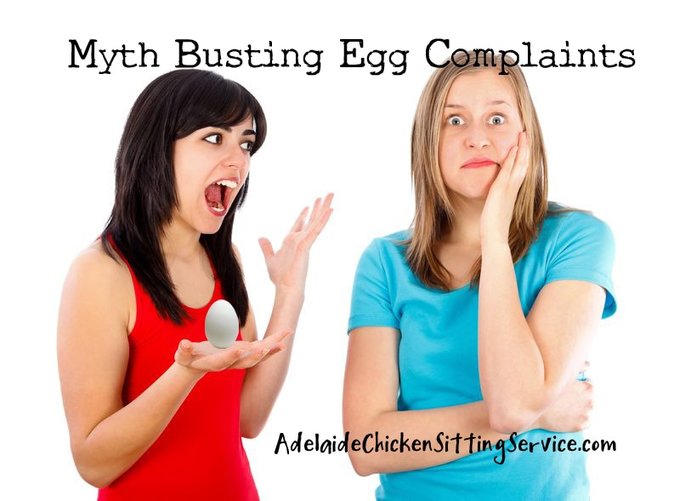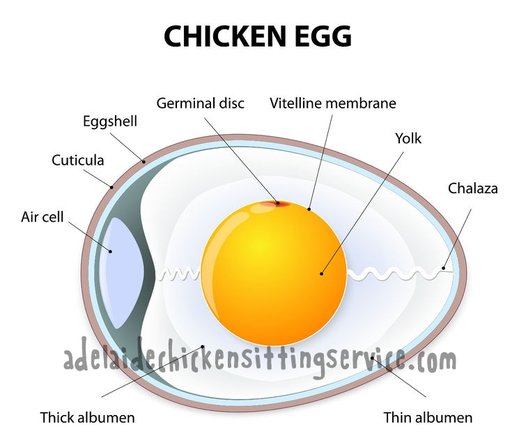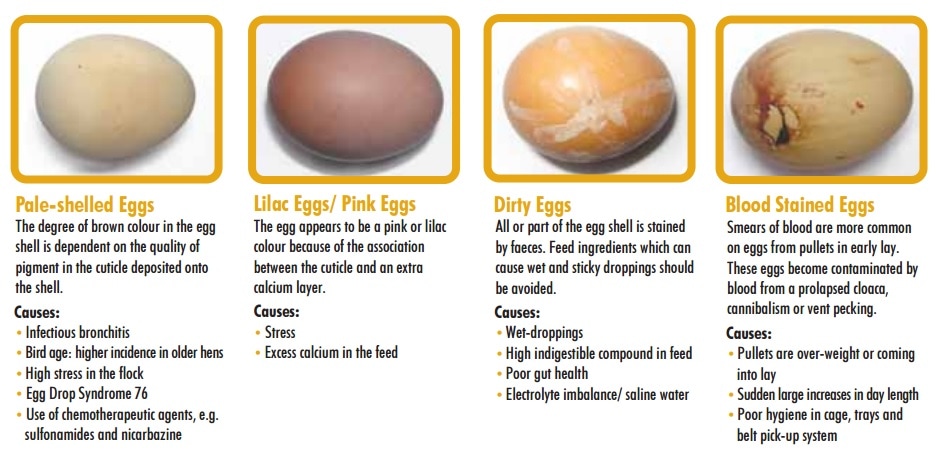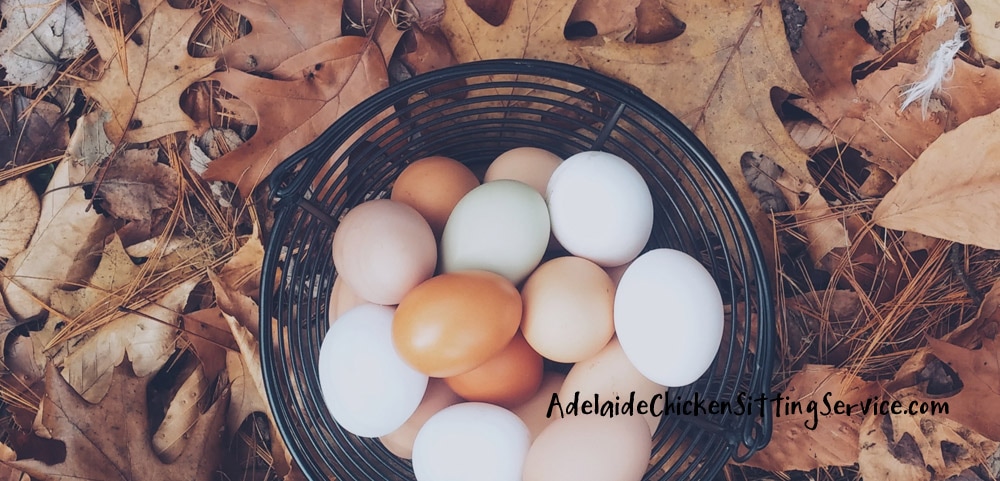But then comes the inevitable BUYER COMPLAINT.
To a poultry owner, any complaints against our beautiful girls’ eggs can feel like a slap in the face.
We are not mass producers who keep chickens locked up all day in a big shed inside cages that are as small as an A4 sheet of paper. We give them sunshine, foraging, treats, and the best healthcare. Did we mention the extra treats and love?
So what are these complaints based on? The need for some egg education.
EGG-UCATION
ANSWER: What looks like umbilical cords are actually an important part of the egg called the Chalaza. It helps to hold the egg yolk in place and completely normal and edible. The older the egg becomes, the harder it is to see.
COMMENT: “Your eggs are fertilised. I can see a white dot on the egg yolk. I was told this is a start of a baby chick.”
ANSWER: All yolks have a little white dot on them. When you crack open the egg, it may be hidden underneath, but every egg will have one. This is called the Blastoderm (Germinal Disc). If it is fertile, it will look like a bulls-eye. Even then, fertilised eggs are still completely edible at this early stage.
COMMENT: “Your egg shells are too thin. My husband says you should give them something called shellgrit.”
ANSWER: This is a challenge for almost every chicken owner on the planet. Sometimes it’s just great genetics that make strong shells, other times it can be dietary. Shellgrit may be present all the time, but some hens won’t eat shellgrit, other times it can be because they have had too many dark leafy greens in their diet which may block calcium – it is all about balance. Changes in temperature and age are also to blame. Many owners use Apple Cider Vinegar in the hen’s water to help with their calcium up take. But sometimes, nothing fixes it.
COMMENT: “Your eggs have white crumbly bits on the outside. Is this…from worms, OK to eat, is your chicken sick, will this make me sick, etc.?”
ANSWER: It is normally to find extra calcium deposits on the external shell from time to time. This is an excess of calcium that the chicken releases. This will in no way affect the egg internally nor increase the egg’s calcium level in your diet. Worm eggs do NOT live on the outside of eggs.
COMMENT: “The eggs shells are all different colours. Do they taste different? Do the blue coloured eggs have a blue yolk?”
ANSWER: Different breeds lay eggs with different coloured shells. This does not affect the flavour or health value of the egg in any way. The shell does not colour the yolk. All eggs are the same on the inside.
COMMENT: “One egg shell is all wrinkly looking. Is it safe to eat?”
ANSWER: Egg shells can go through all sorts of stresses inside the chicken’s body for one reason or another. This might be affected by reduced hours of sunlight, sudden change in diet, flock stress of introducing new hens, health and pecking order. Sometimes, the stresses are not even evident, but egg shells are not always 100% perfect but this does not affect the taste of the egg inside.
COMMENT: “There was dried chicken poo on one of the eggs. I threw it out.”
ANSWER: The dilemma of to wash or not to wash eggs is always going to be a big debate. If eggs are washed, this can allow a transference of bacteria to more easily access the egg and therefore cause the egg to become unsafe for consumption. Many people still try to wipe over their eggs with a damp cloth to remove the worst of the soiling which is considered the safer option. However, this may still not be able to fully remove all dried poo. The poo is safest in its dry state, rather than being wet. A slightly dirty shelled egg is still safe to eat so long as the poo does not go into the cracked open egg.
COMMENT: “All the whites looked strangely golden so I threw them out.”
ANSWER: Congratulations, you just threw out the world’s healthiest vitamin packed eggs. Golden whites hold all the vitamins. That’s why people on diets have egg white omelettes.
COMMENT: “Your egg yolks are too pale. These eggs are not from healthy chickens.”
ANSWER: Egg yolks are affected by Vitamin A in the diet. To make darker eggs, increased treats of dark leafy greens, and fruit & vegetables that are red, orange or yellow will help to make them darker. Some chickens may not have access to these in their diet but still pick it up in their dry grain feed. Remember that the majority of vitamins are actually located in the white, not the yolk.
COMMENT: “Maybe you should try a different rooster to make the hens lay different eggs.”
ANSWER: Roosters do NOT help chickens to lay eggs, just like a woman does not need a man to ovulate. Having a rooster does NOT make the eggs different other than fertilised.
COMMENT: “I thought you couldn’t have roosters in this council area.”
ANSWER: You may not have a rooster, but it’s hinting at the same old thing: Roosters do NOT help chickens to lay eggs, just like a woman does not need a man to ovulate. Having a rooster does NOT make the eggs different other than fertilised.
COMMENT: “Your eggs made me sick.”
ANSWER: This one COULD BE TRUE.
- If you have given an antibiotic to any of your poultry within the last month, this can cause a person to become very ill after consuming their egg. Most especially for those who have an allergy to Penicillin. Egg withhold must be practiced for 14-28 days after the last day of medication.
- Salmonella is also transmittable through egg shells. Never sell an egg that has been cracked or shell-less. The shell’s integrity protects the egg interior against bacteria. If you have Salmonella in your small backyard flock, it is very likely that you won’t miss seeing a sick hen infected with it.
Salmonella in chickens
Salmonella in humans - If you collected up a clutch of old eggs that you found hidden in a flower pot without testing them for age by the float test, this may also be where the bad egg may have come from.
- If nothing like this has occurred in the flock, then the basis for the complaint really needs to be questioned a little further. There may be been other handling issues by the buyer.
COMMENT: “Are your chicken eggs organic?”
ANSWER: Organic status is incredibly hard to obtain. Not only does the soil in your yard have to have passed the 8-year-organic-certification-test, but the food source the hens consume must also be certified organic. Fruit and veg scraps that they are given as treats also have to have been 100% certified organic. They cannot be vaccinated or given worming treatment. This would only be truly obtainable by dedicated organic farmers who can achieve this on the scale (and cost) that it needs. So the likelihood of ‘organic’ looks incredibly unlikely from most backyard poultry keepers.
COMMENT: “Are your chickens vegetarian?”
ANSWER: Chickens are omnivores, which means that they need a certain level of protein that grains alone cannot provide. Chickens are known to hunt and eat mice or eat their own eggs if their protein levels are too low in their diet. Meat products, meal worms, yoghurt and black sunflower seeds are all good extra sources of protein. They need a balanced diet to keep laying eggs.
COMMENT: “Your eggs are difficult to hard boil. All the shell gets stuck to them. This doesn’t happen with the ones I buy from the shop.”
ANSWER: Eggs that are FRESH are great for poaching and frying, while the older eggs are ideal for hard boiling. It’s all about the age of the egg. Shop bought eggs are older when sold.
COMMENT: “I want more of those brown eggs. They are healthier than the white ones.”
ANSWER: The shell colour does not affect the flavour or vitamin value of an egg.
COMMENT: “I can only eat the white shelled eggs because they are sanitary.”
ANSWER: Whiteness does not equal cleanliness. In Australia, we do not bleach or pasteurise eggs.
COMMENT: “If you don’t have that breed of chicken any more, I can’t buy from you. Only the eggs from that particular chicken breed will cure my illness.”
ANSWER: There is no scientific proof that eggs from any breed of poultry will cure any illness. This is a dangerous myth to trust in.
COMMENT: “I can’t eat eggs from a flock that has a rooster in it. I’ll be eating their babies.”
ANSWER: Not all roosters are kept with the hens. Not all eggs will be fertile. Once eggs are collected and stored in the refrigerator, it stops the cell division process. These eggs are completely safe to eat. Only eggs left as room temperature for up to a week will show signs of development. If eggs are being stored in the fridge, there should be no concern; they will still be eaten.
COMMENT: “I found a spot of blood inside one of the eggs. What’s wrong with your chickens?”
ANSWER: Blood or meat spots inside of an egg will happen from time to time as things move down through the reproductive tract when egg laying. It is random and does not indicate anything wrong with the chicken. It’s only blood in the poo that would be an indicator of poor health. The blood or meat spot can be easily removed from the white with a spoon or part of the egg shell. The egg is not tainted.
COMMENT: “I couldn’t get your eggs to hatch in my incubator. My kids were so disappointed.”
ANSWER: Unfertilised eggs won’t ever hatch because there is no chick developing inside of them. Fertilised eggs cost a lot more if I sold them to you, by the way. (P.S. I’m not a breeder.)
COMMENT: “Your eggs tasted weird this time. What’s going on?”
ANSWER: Did we feed our chickens something different like onion, fish or a new weed that they hens have access to? All these things can change the flavour of the egg.
But also consider where did the BUYER store the eggs after purchase? Was it near an onion in the fridge or something else a little more pungent?
COMMENT: “I didn’t expect that you would have any eggs available this week after the thunderstorm a couple of nights ago. Didn’t that put your chickens off of laying?”
ANSWER: No tractor, combine harvester, egg truck, milk truck, grain milling, drilling or shed construction ever put any chickens off of laying on a farm. We have eggs available this week for you.
COMMENT: “Why don’t you have eggs available all the time?”
ANSWER: In summer and autumn, chickens can go through three things that will put them off of laying for a short while:
- Moulting season (loss of feathers to regrow new ones)
- Broodiness (they sit without laying eggs)
- Heat stress (reduces the desire to lay eggs)
COMMENT: “I buy from you because the supermarket eggs are full of hormones.”
ANSWER: No egg is full of hormones unless it is growing into a beautiful little chick inside.
COMMENT: “Your eggs are natural. They come from actual chickens.”
ANSWER: All eggs come from poultry. (This conversation has happened more times that what I can recall. Unless they meant reptiles as the alternative.)









 RSS Feed
RSS Feed